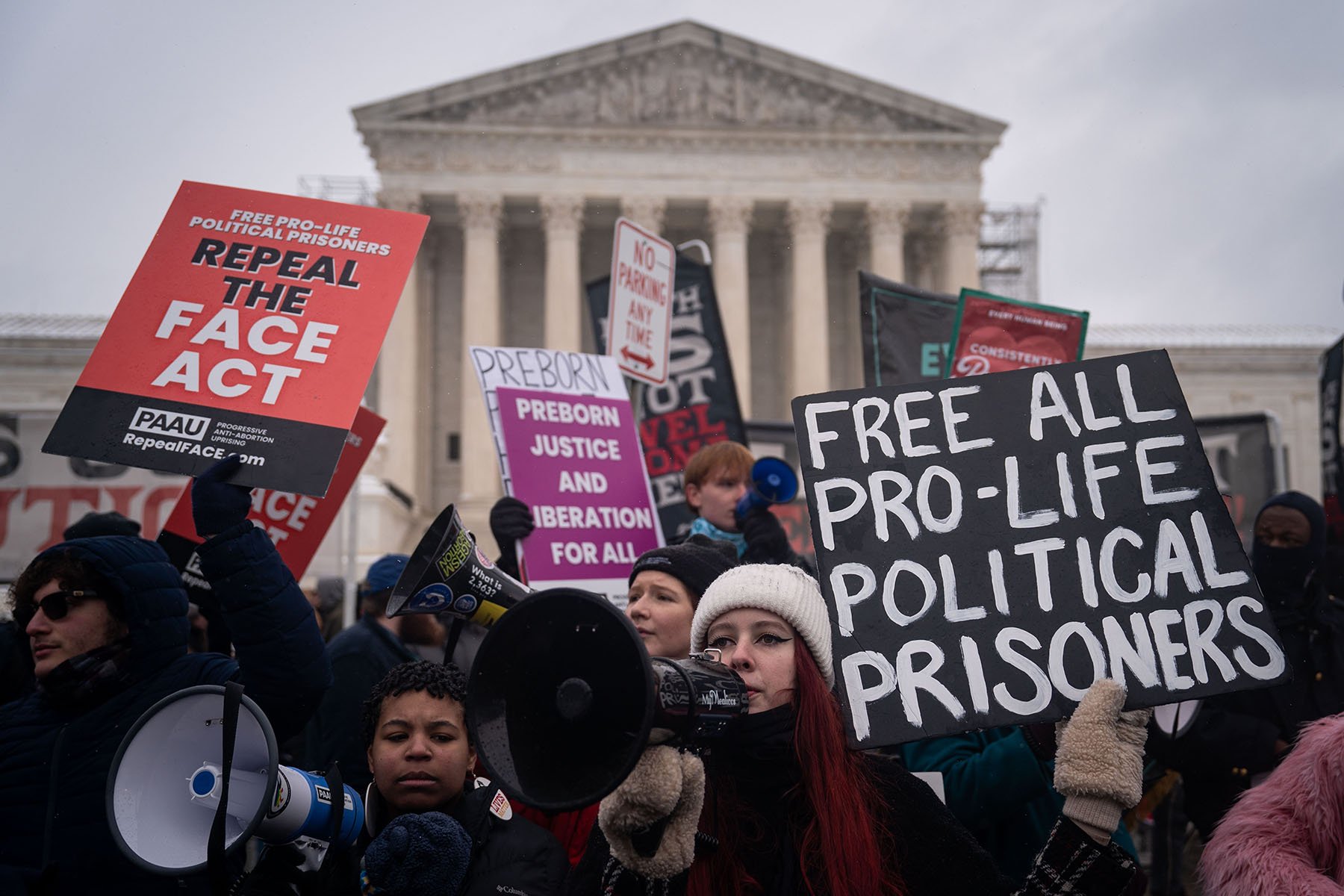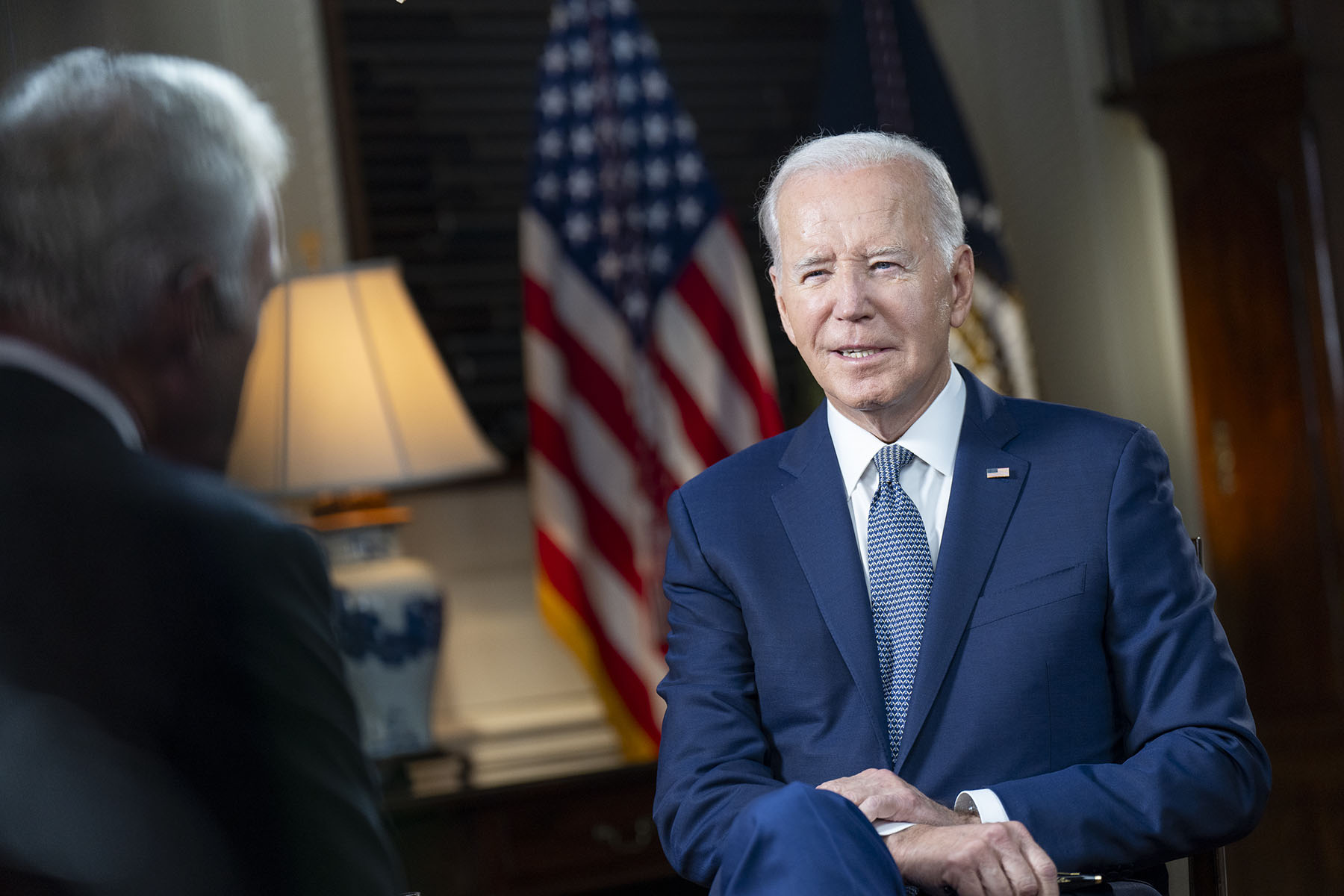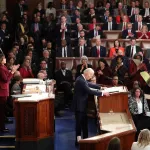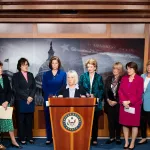White House officials and congressional Democrats are marking the 51st anniversary of Roe v. Wade with a renewed urgency — and framing the 2024 election as pivotal to restoring federal abortion protections.
A year and a half after the Supreme Court struck down Roe’s federal abortion protections in Dobbs v. Jackson Women’s Health Organization, over a dozen states have total abortion bans in effect, and more restrict it before fetal viability, leaving patients without access and providers in limbo. While Republican-led legislatures have passed such restrictions, in the same time frame voters have consistently voted to expand abortion rights and rebuked anti-abortion politicians in high-profile elections.
Aides and advisers to President Joe Biden point to this record as he faces a likely rematch against former President Donald Trump, who appointed three of the justices on the court and has claimed credit for Dobbs. They see abortion as a highly motivating issue for voters — and also view the ballot box as the sole path to restoring the protections of Roe.
“Fundamentally, this is an issue where people see it as a core freedom,” White House domestic policy advisor Neera Tanden told a group of reporters gathered at the White House on Friday afternoon, calling reproductive rights “a cornerstone issue.”
The challenge for Biden and his party is selling the limited actions they’ve taken to enshrine abortion and contraception access. They must convince voters that reelecting Biden, along with Democratic control of Congress, is the only route to bring back abortion access nationwide.
-
Explore Our Dashboard:
-
Explore Our Dashboard: What abortion looks like in every state — right now
“The overturning of Roe — while it’s an important anniversary to mark and that’s why we are marking it — it was the beginning. It is not the end,” Jen Klein, director of the White House Gender Policy Council, told reporters. “And we’re going to continue to fight, because Republicans in Congress are determined to pass a national abortion ban to criminalize care in every state.”
On Monday morning, Klein released a memo laying out how the White House believes Republican elected officials “continue sowing chaos” in a “quest to ban abortion nationwide.”
The White House also unveiled actions intended to fortify access to contraception for those with private health insurance; bolster the physical security of pharmacies distributing abortion pills; and disseminate information and resources focused on ensuring patients have access to emergency abortion and miscarriage care under a federal law known as EMTALA. Biden will convene a meeting of his Reproductive Rights Task Force on Monday to receive recommendations on implementing past executive orders.
Litigation has been another prong of the Biden administration’s strategy. The Justice Department has sued Idaho for running afoul of EMTALA with its strict abortion ban in a case now set to be heard in the U.S. Supreme Court. But experts argue that EMTALA is, in many ways, an imperfect vehicle for challenging abortion bans. The high court will also hear a case on access to mifepristone, a commonly used abortion drug, this term.
The Biden administration has issued executive orders and regulations to shore up access to contraception and medical abortion, protect patient privacy and create new resources for patients to navigate an uncertain landscape. But officials acknowledge that without Congress, it has limited tools because the Supreme Court put abortion’s legality in the hands of the states.
“We, and the president himself, have been laser-focused on passing federal legislation as the only way to restore the protections that were lost under Roe,” Klein said.
It took Republicans and anti-abortion activists over 40 years to install the conservative high court supermajority that overturned Roe. A senior Biden adviser said while it may not take as long for Democrats to pass federal abortion rights through Congress, they need to continue winning elections and organizing at the state level — and can’t underestimate their opponents.
-
Read Next:
The White House sees itself as a clearinghouse and locus of support for state-level policymakers and advocates to share strategies. Vice President Kamala Harris has been the main public face of the White House’s response to Dobbs in public appearances and convening meetings and roundtables of state lawmakers, students, university presidents, faith leaders and other groups to discuss the issue.
“We recognize this is a battle in the states,” Tanden said. “In the vice president’s advocacy and bringing state leaders here, our focus has been on getting states to be as expansive as possible.”
On Monday, Harris will kick off a nationwide tour on reproductive rights starting in Wisconsin, a state critical to the 2024 presidential race.
A senior Harris policy adviser said the reproductive rights tour would both draw the contrast between the Biden administration’s actions and Republican-led states’ abortion bans and highlight the power of voters to reverse abortion bans with state-level elections and ballot measures. In Wisconsin, Democrats flipped control of the state Supreme Court last year in a race heavily shaped by abortion. On Friday, Harris was swift to criticize Wisconsin Republicans for proposing putting a measure before voters that would limit abortion after 14 weeks.
Biden, Harris, First Lady Jill Biden and Second Gentleman Doug Emhoff are set to hold a campaign rally Tuesday in Northern Virginia focused on abortion and reproductive rights — the first time the four will appear together since Biden formally launched his reelection campaign in April 2023. Democrats prevailed in November’s legislative elections in Virginia, denying a trifecta to the state’s Republican governor who pitched a 15-week abortion ban as a compromise position.
Congressional Democrats are also keen to keep abortion rights front and center on the would-be anniversary of Roe. On Wednesday, a group of Democratic senators led by Patty Murray of Washington put a spotlight on the consequences of the overturning of Roe v. Wade to patients and providers.
-
Read Next:
The witnesses included Dr. Austin Dennard, a Texas-based OB-GYN and one of the patient plaintiffs in a lawsuit, Zurawski vs. Texas, who say they were denied necessary medical care for nonviable pregnancies under Texas’ near-total abortion ban. Dennard testified about her heart-wrenching experience learning that her wanted pregnancy was nonviable — and needing to leave the state for care — in summer 2022, shortly after the Dobbs decision. Dennard also featured her story in a 60-second Biden campaign ad released on Sunday titled “Forced.”
“My home state has stripped me of my own reproductive rights while simultaneously disassembling the most important foundation of a doctor-patient relationship: trust and open, honest communication,” Dennard said at the Senate hearing.
While many states’ abortion bans have exceptions in theory for threats to life of the pregnant patient, their ambiguity has left providers afraid of breaking the law. Many state laws also do not include exceptions for nonviable fetal abnormalities.
In 2023, the first full year without Roe, more stories of patients who said they faced medical emergencies or were forced to flee their own states to receive care for nonviable pregnancies made national news — and caught the attention of Democratic campaigns.

Another Texas woman, Kate Cox, sued to obtain an abortion in late 2023 after learning her pregnancy was unviable and dangerous to her health. After being denied by the courts, she ended up traveling elsewhere for care. An Ohio woman, Brittany Watts, was arrested for abuse of a corpse in October after experiencing a miscarriage at home; a grand jury declined to bring charges against her.
Watts’ and Cox’s names have become synonymous with both the toll of abortion bans — and the real threat of criminalization against patients and providers — for Democrats and Biden campaign officials, who now frequently reference both womens’ cases.
Democrats emphasized that if Republicans gain control of both chambers of Congress, they could pass a national ban on abortion. At the Wednesday hearing, Senate Democrats again pushed for passage of the Women’s Health Protection Act, which would restore federal abortion protections and guarantee a right to travel for abortions. The White House’ Office of Management and Budget issued a statement of support for the legislation in 2022, saying the president “stands ready” to sign the law.
-
Read Next:
But a future Republican administration could significantly curtail access to abortion without Congress passing a bill. There are signs they could shy away from a federal ban: At the March for Life in D.C. on Friday, prominent abortion opponents shied away from directly calling for a national abortion ban, instead pushing for more funding for anti-abortion centers.
Anti-abortion activists and groups aligned with Trump are drawing up plans to enforce provisions of the Comstock Act, a series of 19th-century anti-obscenity laws that could be used to heavily restrict the mailing of medication abortion and other medical equipment. The Biden administration issued guidance in 2022 stating the Comstock Act does not apply to the mailing of mifepristone, but a future administration could rescind that guidance.
“By the way, that enforcement can be retroactive,” Klein said of the Comstock Act. “So it’s super dangerous. And it is one of the reasons that we’re incredibly focused on trying to make clear that this administration, and this president, will continue to protect access to abortion.”
Many advocacy groups and some Democratic lawmakers are calling for expanding federal funding and access, particularly to lower-income women and women of color who are disproportionately affected by abortion bans.
“The Biden administration needs to continually innovate and think creatively about solutions,” Nourbese Flint, vice president of strategy at the abortion justice advocacy group All* Above All Action Fund, said on a Wednesday afternoon call with reporters. “We know the answer to abortion access is not in 1973,” when Roe was decided.
Klein did not endorse a specific legislative proposal for restoring federal abortion protections, saying the administration would follow Congress’ lead and work with lawmakers from there.
“Because I work for Joe Biden, I am an optimist,” Klein said. “I believe that Congress, one way or another, will pass that law and President Biden will sign it.”









